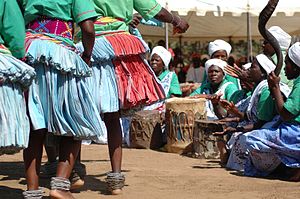- Tsonga people
-
VaTsonga  Traditional Tsonga Dancing
Traditional Tsonga DancingTotal population 4.6 million (late 20th century estimate)[1] Regions with significant populations Mozambique, South Africa, Zimbabwe, Swaziland Languages Religion The Tsonga people (Tsonga: VaTsonga) inhabit the southern coastal plain of Mozambique, parts of Zimbabwe and Swaziland, and the Limpopo Province of South Africa. They numbered some 4.6 million in the late 20th century.[1]
Contents
Demographics
The Tsonga people speak the Tsonga language (Xitsonga) Although many Tsongas are Christian, many also adhere to their own traditional religion, which entails constant attention to the propitiation of ancestral spirits. Illness and other misfortunes are usually attributed to the breaking of a taboo, to the anger of an ancestor, or to sorcery.[1]
The Tsongas are a diverse population, generally including the Shangaan (VaChangana), Thonga, Tonga (unrelated to another nearby Tonga population to the north), and several smaller ethnic groups.[2] In the mid-1990s, they numbered about 1.5 million in South Africa and at least 4.5 million in southern Mozambique and Zimbabwe.[2]
Sometimes, the definition of Tsonga is extended to include the closely related Ronga and Tswa peoples of Mozambique.[3]
History
It is believed that ancestors of the Tsonga, who now primarily inhabit an area in southern Mozambique, originated farther north in central Africa.[3]
During the mfecane and ensuing upheaval of the nineteenth century, most Tsongas moved inland.[2] Some successfully maintained their independence from the Zulu, while others were conquered by Zulu warriors even after they had fled.[2] One Zulu military leader, Soshangane, established his command over a large Tsonga population in the northern Transvaal in the mid-nineteenth century and continued his conquests farther north.[2] He created the Gaza Empire with its capital in Mossurize on the present-day border with Zimbabwe. Gaza comprised parts of what is now south-eastern Zimbabwe, parts of South Africa, as well as extending from the Save River down to the southern part of Mozambique, covering parts of the current provinces of Sofala, Manica, Inhambane, Gaza, and Maputo in Mozambique.
The descendants of some of the conquered populations are known as the Shangaan, or Tsonga-Shangaan. Some Tsonga-Shangaan trace their ancestry to the Zulu warriors who subjugated the armies in the region, while others claim descent from the conquered chiefdoms.[2]
After the death of Soshangane in 1856, his son Muzila came into power. After Muzila came Ngungunhane, who was imprisoned by the Portuguese in Mandlakazi (now called Manjacaze in Gaza Province in Mozambique) in 1895 resulting in the end of the Gaza Empire.
Within apartheid South Africa, a Tsonga-Shangaan "homeland", Gazankulu, was created out of part of northern Transvaal Province during the 1960s and was granted self-governing status in 1973.[2] This bantustan's economy depended largely on gold and on a small manufacturing sector.[2] However, only an estimated 500,000 people—less than half the Tsonga-Shangaan population of South Africa—ever lived there.[2] Many others joined township residents from other parts of South Africa around urban centers, especially Johannesburg and Pretoria.[2]
Economy
The Tsonga traditional economy is based on mixed agriculture and pastoralism. Cassava is the staple; corn (maize), millet, sorghum, and other crops are also grown. Women do much of the agricultural work, although some men grow cash crops. Most Tsongas now depend on wage labour for cash, many migrating to Zimbabwe or South Africa to find work.[1]
Culture
Tsonga men traditionally attend the initiation school for circumcision called Matlala (KaMatlala) after which they are regarded as men.
The Tsonga people living along the Limpopo River in South Africa have recently gained a significant amount of attention for their low-tech, lo-fi electronic dance music. Tsonga electro has been pioneered by South African producer 'Dog'. The Tsonga's are also known for a number of traditional dances such as the xibelani dance.
References
- ^ a b c d "Tsonga". Encyclopædia Britannica Online. Retrieved 15 July 2011.
- ^ a b c d e f g h i j "Tsonga and Venda". South Africa: A Country Study. Rita M. Byrnes, ed. Washington: GPO for the Library of Congress, 1996. Retrieved 15 July 2011.
- ^ a b Orville Boyd Jenkins. "The Shangaan (Tsonga) People of Southeastern Africa". Retrieved 15 July 2011.
Bibliography
- Junod, Henri Alexandre. (1927). The Life of a South African Tribe. London (second edition).
- The Fader – Ghetto Palms 90: New Styles/Shangaan Electro/South Africa Road Epic! [1]
External links
Ethnic groups in South Africa Bold denotes major ethnic groups.Blacks
(all Bantu)Sotho-TswanaOtherTsonga · VendaWhites Asians Coloureds Capoid Categories:- VaTsonga people
- Ethnic groups in South Africa
- Ethnic groups in Mozambique
- Ethnic groups in Zimbabwe
- Mozambique stubs
- African ethnic group stubs
Wikimedia Foundation. 2010.
